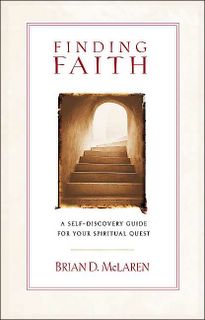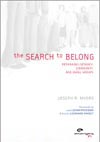This over-arching understanding of the purpose of our humanity should drive all that we do--from our worship to our relationships to our work.
Check it out here:

Image Dei-The Image of God in Man

 Each year, I re-read this incredible book. For anybody who wishes to better communicate the Gospel to the unchurched, this is the first Apologetic Book specifically targeted at the postmodern person.
Each year, I re-read this incredible book. For anybody who wishes to better communicate the Gospel to the unchurched, this is the first Apologetic Book specifically targeted at the postmodern person.

Now, I know that a lot of us evangelicals voted for George W. Bush on the grounds of "moral values." That story has made all the news. Okay.
That’s why I am troubled. I wonder why I have not heard more evangelical Christians upset about the way the Bush Administration reinterpreted the rules for the use of torture. The Bush team departed radically from convention when it loosened long-standing rules governing the interrogation of prisoners. This change is something that’s been known since last June when the Justice Department memo from Attorney General designate Alberto Gonzales was sent to Bush describing aspects of the Geneva protocols against torture as "quaint" and "obsolete." The man that Bush has nominated as the top prosecutor of American law played a large role in orchestrating, if not actually drafting, a change in our country’s stand on torture!
But we Christians are not saying a thing during Gonzales’ confirmation hearings about this. And the Democrats are being creampuffs on Gonzales as well; in the words of Time Magazine, “Gonzales is certain to be confirmed as John Ashcroft's replacement, especially because Democrats are wary of opposing a Hispanic when their hold on that constituency was weakened in the last election.”
You’ve got to be kidding! You won’t call a guy out for putting the American stamp “OKAY” on torture because he’s Hispanic? You’ll let politics get in the way of truth? (Why am I surprised?)
The hearings did offer a few interesting tid-bits, however:
Senator Patrick Leahy got Gonzales to admit that he had consulted with the Justice Department's office of legal counsel about the torture memo. There were meetings in his White House office. Techniques like waterboarding—when they strap down a prisoner and make him believe he's going to drown—“may” have been discussed. Gonzales admitted that he did “generally support” the thrust of the Justice Department's decision to severely constrict the definition of torture. (In other words, since they wanted to torture people, they simply redefined 'torture' more narrowly, so that they could say, “We didn’t 'torture' anybody.”)
Senator Herbert Kohl got Gonzales to admit that the Bush Administration policy on torture had "migrated" to the CIA and Pentagon and from there to Guantanamo Bay and Abu Ghraib. (In other words, the atrocities at Gitmo and Abu Ghraib were at least an indirect result of the Bush Administration’s tinkering with the definition of torture).
Senator Richard Durbin asked a question that should have Christians who hold to “moral values” infuriated with the Bush Administration. Durbin asked whether or not, even after all the pressure to change our stand on torture back toward the Geneva conventions, United States personnel today could legally engage in torture under “any circumstances.” Gonzales answered, "I don't believe so, but I'd want to get back to you on that and make sure I don't provide a misleading answer."
What?! You’ve got to be kidding me! Why is the nominee for Attorney General waffling on this? Is it because he is still trying to redefine our nation’s definition of torture?
Don’t get me wrong; I think that in the war against terrorism, the use of aggressive, nonviolent interrogation techniques is often appropriate to get the information we desperately need to battle the evil of terrorism. But that is a far cry from what the Bush Justice Department has been advocating. Time reports, “In the summer of 2002, the CIA and Gonzales asked the Justice Department's Office of Legal Counsel for an opinion on the definition of illegal interrogation methods. On Aug. 1, 2002, Assistant Attorney General Jay Bybee sent Gonzales the following guidance: the President is within his legal limits to permit his surrogates to inflict ‘cruel, inhuman or degrading’ treatment on prisoners without violating strictures against torture. For an act of abuse to be torture, the interrogator must be inflicting pain ‘equivalent in intensity to the pain accompanying serious physical injury, such as organ failure, impairment of bodily function or even death.’ The definition of illegal torture had been significantly narrowed, which meant that anything short of that was O.K.”
Where’s the moral outrage from Christians over that?